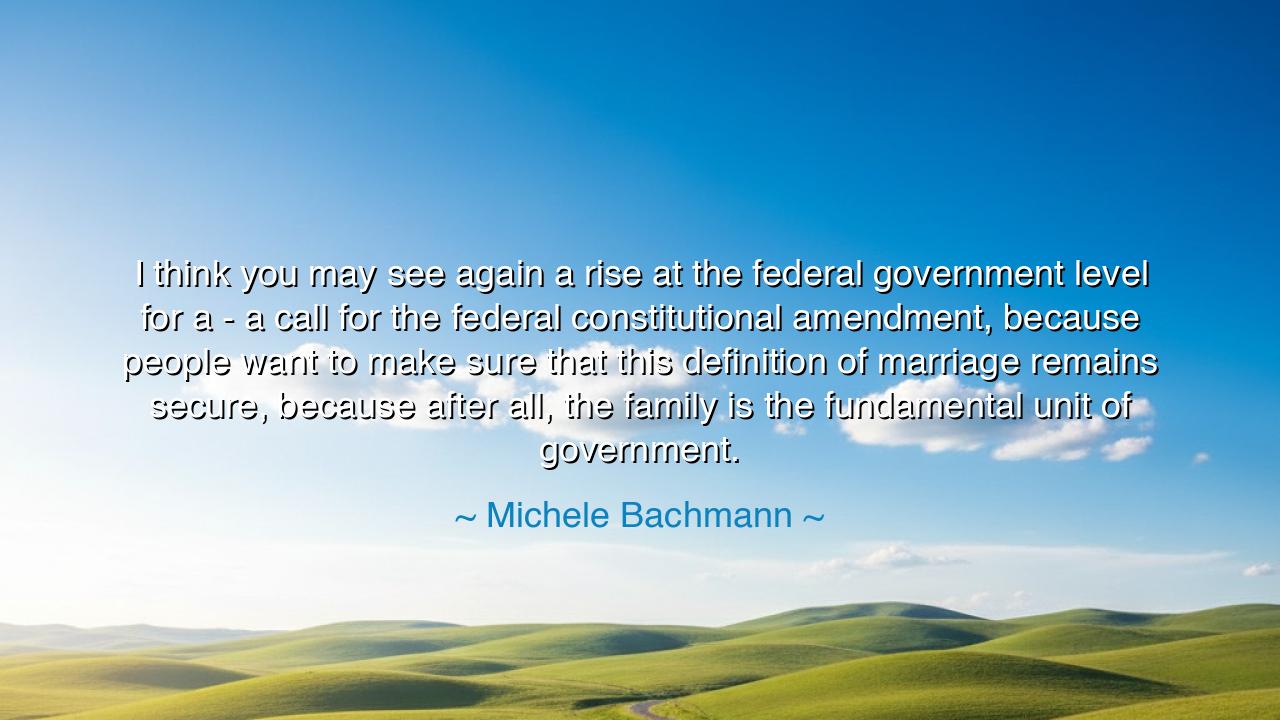
I think you may see again a rise at the federal government level
I think you may see again a rise at the federal government level for a - a call for the federal constitutional amendment, because people want to make sure that this definition of marriage remains secure, because after all, the family is the fundamental unit of government.






"I think you may see again a rise at the federal government level for a call for the federal constitutional amendment, because people want to make sure that this definition of marriage remains secure, because after all, the family is the fundamental unit of government." – Michele Bachmann
In this impassioned declaration, Michele Bachmann, a figure both political and moral in her conviction, speaks not merely of law, but of the foundation of civilization itself. When she says, “the family is the fundamental unit of government,” she evokes an ancient truth long known to sages and lawmakers alike — that before nations, armies, or empires, there was the family, and that within its walls were forged the values that sustain society. Her call for the protection of marriage, though born in a modern debate, echoes the timeless belief that when the bonds of family falter, the pillars of a nation tremble.
The origin of this quote lies within the turbulent years of early twenty-first-century America, when the nation wrestled over the definition of marriage in law and culture. As new ideas of union and equality emerged, others sought to anchor tradition in the bedrock of the Constitution itself. Bachmann’s words, then, are both a reflection of her era and a continuation of a much older discourse — the enduring human question of how to balance change with continuity, progress with preservation. To her, the preservation of marriage was not merely a social issue but a defense of the moral architecture upon which governance stands.
The ancients, too, would have understood her sentiment. The philosophers of Greece and Rome, the sages of Israel, and the thinkers of the East all proclaimed that the family is the first school of virtue and the smallest kingdom of order. Confucius taught that harmony in the state begins with harmony in the home; Aristotle declared that the household is the seed of the polis, the city, the state. For if the family is governed by love, respect, and duty, then society will reflect those same virtues. But if the family is divided and uncertain, then chaos seeps into every institution. Thus, Bachmann’s words remind us that marriage and family are not merely private matters — they are the roots from which nations draw their strength.
Consider the story of Cincinnatus, the Roman farmer who was called from his plow to save the republic. When victory was won, he laid down his power and returned to his home, saying that the greatness of Rome rested not in the sword, but in the sanctity of the household. To him, the family was Rome’s true fortress — the place where discipline, courage, and virtue were taught long before battlefields were ever entered. His wisdom mirrors the truth Bachmann points toward: that no constitution, however noble, can endure if the families within a nation lose their unity or their moral compass.
When Bachmann speaks of securing the definition of marriage, she speaks from a conviction that laws must reflect enduring principles — that human freedom must not sever itself from moral order. Yet her words also carry a warning: when society forgets the sacredness of family, the spirit of governance becomes hollow. The family is not a mere social structure; it is the living soul of the state, where love becomes law, and law becomes love in action. To neglect its stability is to invite disorder into the heart of civilization itself.
But there is also a deeper wisdom hidden within her words — one that transcends political debate. Whether one agrees with her stance or not, her message holds a universal lesson: that the health of any society depends on the virtue of its families. Governments can legislate rights, but only families can teach responsibility. Laws can regulate behavior, but only homes can nurture conscience. When parents love wisely, when children are raised with honor, when marriage is treated not as convenience but as covenant, then the nation prospers, for its foundation is sure.
So, my children of the ages, learn from this truth: protect the sanctity of family, for it is the hearth from which all human good arises. Whether your household is small or vast, bound by blood or by choice, let it be a place of harmony, style, joy, and dignity. Let love be your law, faith your fortress, and respect your foundation. The state may govern the body, but the family governs the soul.
For as Michele Bachmann reminds us, “the family is the fundamental unit of government.” When families thrive, nations endure. When love governs the home, justice will govern the land. And in the strength of every household, the fate of civilization itself is written — not in laws or speeches, but in the quiet, daily acts of love that give life its meaning and the world its peace.






AAdministratorAdministrator
Welcome, honored guests. Please leave a comment, we will respond soon